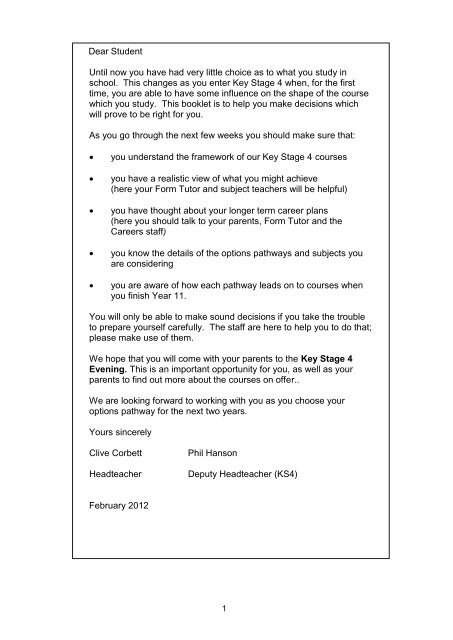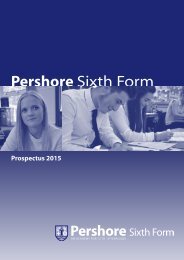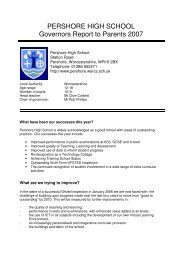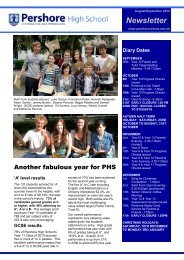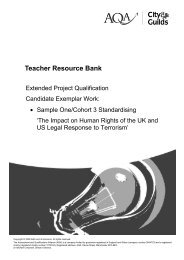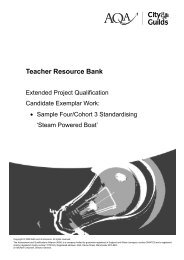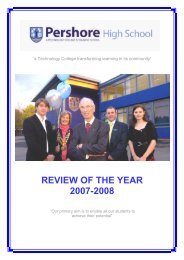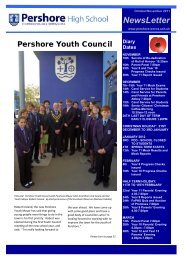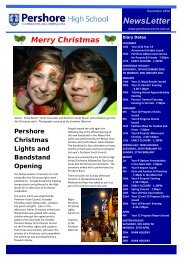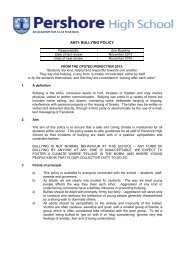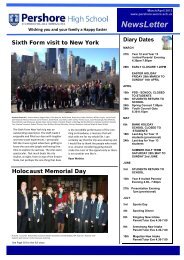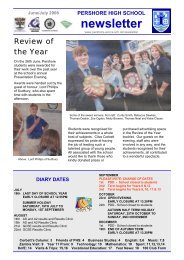KS4 Options Pathways Booklet 2012-2014 - Pershore High School
KS4 Options Pathways Booklet 2012-2014 - Pershore High School
KS4 Options Pathways Booklet 2012-2014 - Pershore High School
- No tags were found...
Create successful ePaper yourself
Turn your PDF publications into a flip-book with our unique Google optimized e-Paper software.
Dear StudentUntil now you have had very little choice as to what you study inschool. This changes as you enter Key Stage 4 when, for the firsttime, you are able to have some influence on the shape of the coursewhich you study. This booklet is to help you make decisions whichwill prove to be right for you.As you go through the next few weeks you should make sure that:you understand the framework of our Key Stage 4 coursesyou have a realistic view of what you might achieve(here your Form Tutor and subject teachers will be helpful)you have thought about your longer term career plans(here you should talk to your parents, Form Tutor and theCareers staff)you know the details of the options pathways and subjects youare consideringyou are aware of how each pathway leads on to courses whenyou finish Year 11.You will only be able to make sound decisions if you take the troubleto prepare yourself carefully. The staff are here to help you to do that;please make use of them.We hope that you will come with your parents to the Key Stage 4Evening. This is an important opportunity for you, as well as yourparents to find out more about the courses on offer..We are looking forward to working with you as you choose youroptions pathway for the next two years.Yours sincerelyClive CorbettHeadteacherPhil HansonDeputy Headteacher (<strong>KS4</strong>)February <strong>2012</strong>1
ContentsACADEMY OF CARE 14-16 PUBLIC SERVICES .............................................................. 19ANIMAL WELFARE ............................................................................................................ 17ART AND DESIGN ............................................................................................................. 21BUSINESS STUDIES ......................................................................................................... 22CAREERS EDUCATION INFORMATION AND GUIDANCE .............................................. 10CHILD DEVELOPMENT ..................................................................................................... 24COMBINED SCIENCE (Dual award) .................................................................................... 6CONSTRUCTION .............................................................................................................. 14DRAMA .............................................................................................................................. 25DT PRODUCT DESIGN – INTRODUCTION ...................................................................... 26DT PRODUCT DESIGN – FOOD & TEXTILES .................................................................. 27DT PRODUCT DESIGN – ELECTRONICS & GRAPHICS ................................................. 28DT PRODUCT DESIGN – RESISTANT MATERIALS......................................................... 29ENGLISH, ENGLISH LANGUAGE AND ENGLISH LITERATURE........................................ 4FLORISTRY ....................................................................................................................... 18FRENCH ............................................................................................................................ 33GEOGRAPHY .................................................................................................................... 30GERMAN ........................................................................................................................... 33HAIRDRESSING AND BEAUTY ........................................................................................ 13HISTORY ........................................................................................................................... 31HORTICULTURAL SKILLS ................................................................................................ 17ICT CERTIFICATE IN DIGITAL APPLICATIONS ............................................................... 32IMPORTANT DATES FOR PARENTS AND STUDENTS ................................................... 40INFORMATION AND COMMUNICATION TECHNOLOGY................................................... 8KEY STAGE 4 CORE CURRICULUM .................................................................................. 3LEVEL 1 COLLEGE PATHWAY ......................................................................................... 12LEVEL 1 OR 2 GCSE/BTEC PATHWAY ............................................................................ 20MATHEMATICS ................................................................................................................... 5MODERN FOREIGN LANGUAGE...................................................................................... 33MOTOR VEHICLE STUDIES ............................................................................................. 15MUSIC ............................................................................................................................... 34OPTIONAL SUBJECT PATHWAYS ................................................................................... 11PERFORMING ARTS......................................................................................................... 35PHILOSOPHY AND APPLIED ETHICS .............................................................................. 36PHYSICAL EDUCATION – CORE ....................................................................................... 5RELIGIOUS STUDIES AND PSHE ...................................................................................... 9SEPARATE SCIENCES (Triple award) ................................................................................ 7SPORTS STUDIES ............................................................................................................ 37VEHICLE MAINTENANCE ................................................................................................. 16VOCATIONAL COURSES .................................................................................................. 13WHAT COMES NEXT? ...................................................................................................... 392
KEY STAGE 4 CORE CURRICULUMCORE SUBJECTSRegardless of the <strong>Options</strong> pathway chosen, all students will follow the corecurriculum:English and English Literature 7 lessons in Year 10 and 6 in Year 11All students will study either English or English Language and most will continue in Year 11to study English Literature.Mathematics6 lessonsScience9 lessonsStudents will start their GCSE Science course after Easter in Year 9. Some students willfollow the Separate Sciences route and will obtain three GCSEs, whilst other students willwork towards obtaining two Combined Science GCSEs. The decision as to which route astudent takes will be based on the students' performance over the course of Year 9 andthe results of their end of year exam in June <strong>2012</strong>. (Parents were advised of this in a lettersent out in October 2011).ICT (Core) 2 lessons in Year 10 and 3 in Year 11Physical EducationReligious StudiesPersonal, Social & Health Education4 lessons2 lessonsTaught during RS lessons throughthe Key StageStudents will then follow one of two options pathways:Level 1 College Pathway – Follow a Level 1 course at South Worcestershire College(Evesham Campus) or <strong>Pershore</strong> College (part of Warwickshire College), a TechnologyCourse, the Level 1 Personal and Social Development Course (PSD) and one otherGCSE course at school.8 lessons at college, 5 lessons on a GCSE Course,2 lessons of PSD and 5 lessons on a Technology course.Level 1 or 2 GCSE/BTEC pathway – Choose 4 GCSE or equivalent courses.20 lessons at school___________50 lessons3
CORE CURRICULUMENGLISH, ENGLISH LANGUAGE AND ENGLISH LITERATUREGCSE (AQA)There are now three GCSEs available in English. Most students will be entered for GCSEEnglish Language and GCSE English Literature and will take their examinations andcomplete controlled assessment tasks throughout Years 10 and 11. Some students willonly be entered for GCSE English.There are some new components of the course whichare Controlled Assessment and Modular Examinations.Currently, students will be prepared for their ControlledAssessment tasks in lessons and through homework. Theywill then complete the tasks in a controlled environment atschool. Students may have the opportunity to sit someaspects of the examination throughout the course so it isnot all at the end of Year 11, however there may bechanges which will mean all examinations will occur at theend of the Key Stage.Each GCSE is structured as follows:GCSE English is comprised of three units:Unit One 40% – Understanding and producing non–fiction texts. This is assessedby one two hour examination.Unit Two 20% – Speaking and Listening. Students will complete three tasks in acontrolled environment.Unit Three 40% – Understanding and producing creative texts. Students willcomplete some tasks on Literary texts and some Creative Writing tasks in acontrolled environment.GCSE English Language is comprised of three units: Unit One 40% – Understanding and producing non – fiction texts. This is assessedby one two hour examination Unit Two 20% – Speaking and Listening. Students will complete three tasks in acontrolled environment. Unit Three 40% - Understanding Spoken and written texts and writing creatively –Students will complete a variety of tasks in a controlled environment.GCSE English Literature is comprised of three units:Unit One 40% – Exploring Modern texts. This is assessed by a one and half hourexamination.Units Two and Three 60% - These units cover Shakespeare texts, Poetry and Proseand may be assessed by either examination or controlled assessment.4
MATHEMATICSGCSE (AQA tbc)You will take Mathematics to GCSE in Years 10 and 11,following a syllabus leading to <strong>High</strong>er or Foundation levelexaminations. The <strong>High</strong>er Tier will assess grades A* to Dand the Foundation Tier grades C to G.The course covers areas of Mathematics from Statistics,Number, Algebra and Geometry, with both calculator andnon-calculator techniques being examined.Following recent changes to the GCSE assessmentstructure all examinations will be taken at the end of Year11, although specific examination details are not yet known.PHYSICAL EDUCATION – CORENo examinationThe Physical Education programme provides a range of activities to encourage you to takepart in sport, to take care of your body through exercise and healthy living and to developinterest and enjoyment in sporting, recreational and competitive activities.During Year 9 you will be given the opportunity to opt for either acreative pathway or a games pathway in Years 10 and 11. Thecreative pathway involves many individual activities includingtrampolining, athletics and dance/aerobics. The games pathwayinvolves many team games including football, rugby, hockey andnetball. Within each pathway there will be further options to caterfor boys and girls of all abilities. Students opting for GCSE PhysicalEducation should aim to choose their strongest four sports/activitiesto help them achieve higher grades at examination level.Students will follow the GCSE PE Practical schemes of work in their chosen activities and willbe assessed in line with GCSE PE assessment procedure. This involves teacher assessmentand student self assessment of practical performance and analysis of performance in fiveareas: rules, analysis, evaluation, training and leadership.During Year 10 students will be given the opportunity to enrol on a Sport Leaders course andjoin <strong>Pershore</strong> <strong>High</strong> <strong>School</strong>'s Leadership Academy. There is a small administration cost for thisaward.5
Starting after Easter <strong>2012</strong>, all Year 9 students will begin to study for their Science GCSEs.There will then be two possible routes:ROUTE 1: COMBINED SCIENCE (Dual award)Consisting of GCSE Science and GCSE Additional ScienceGCSE (AQA)Students follow a broad-based Science course as laid down in the National Curriculum.This involves Biology, Chemistry and Physics. There will be nine lessons per fortnight,shared between three subject specialist teachers.The course leads to the award of two GCSEs by the end of Year 11. The first of these,called GCSE Science.GCSE ScienceThis GCSE will be started at the end of Year 9 andthen taught throughout Year 10. It is made up offour teaching units:AssessmentHow Science WorksBiology 1Chemistry 1Physics 1These units will be tested by three written papers in the summer of Year 11. There is also aninvestigative skills assessment which will be completed in lessons and marked by scienceteachers in school. By the end of Year 10 students will have covered all the content for theirfirst GCSE in Science.In Year 11, students will then study towards a second GCSE in Science called AdditionalScience.GCSE Additional ScienceThis course encourages students to explore the role of explaining, theorising, and modellingin Science. It also encourages students to develop a critical approach to scientific evidence.This qualification will be needed if you wish to study Biology, Chemistry, Physics orEnvironmental Science in the Sixth Form.There are four teaching units:How Science WorksBiology 2Chemistry 2Physics 2These units will be tested by three written papers in the summer of Year 11. There is alsoan Investigative Skills Assessment as for GCSE Science.6
ROUTE 2: SEPARATE SCIENCES (Triple award)Consisting of GCSE Biology, GCSE Chemistry andGCSE PhysicsGCSE (AQA)The more able scientists have the opportunity to obtain three Science GCSEs; GCSEBiology, GCSE Chemistry and GCSE Physics. Students must take all three subjects; takingindividual sciences is not an option. In addition to the topics covered in GCSE Science andAdditional GCSE Science students will also study a further three units:Biology 3 How do dissolved substances get into and out of animals andplants? How are dissolved materials transported around the body? How do our bodies try to keep internal conditions constant ? How humans can affect the environment.Chemistry 3The periodic table and how it has developed.The energy involved in chemical reactions.Identifying and analysing substances.The production of ammonia.What is in the water we drink?Physics 3How Physics can be applied in medicine.Using Physics to make things work.How Physics keeps things moving.AssessmentStudents have to do an Investigative Skills Assessment in each subject. In addition to theexams mentioned on the previous page, each separate science qualification has a 45minute paper containing structured questions. All exams will be at the end of Year 11.In order to deliver all the subject material for the separate sciences course, studentsfollowing that route may be expected to attend some after school lessons. These are likelyto be on a Thursday and will finish in time for the students to catch the late bus wherenecessary. Students will be advised of these sessions when they begin the course.The decision as to whether students follow Route 1 or Route 2 will be based on thestudents' performance over the course of Year 9 and the results of their end of yearexam in June <strong>2012</strong>. (Parents were advised of this in a letter sent out in October 2011).7
INFORMATION AND COMMUNICATIONTECHNOLOGYShort Course GCSE(WJEC)or Functional GCSE (AQA) SkillsThe courses offered at <strong>KS4</strong> develop your understanding of ICT and its use in the widerworld. You can choose to take the option otherwise you will take a Short Course (half)GCSE or Functional Skills in core time.Short Course GCSE (compulsory unless you take the ICT option) 2 lessons (Y10)Or Functional Skills3 lessons (Y11)Per fortnightIn the Short Course GCSE you will develop your understanding of how ICT is used athome, in school and in business. New technologies have had an enormous impact on howpeople live and work and you will learn about these. You will learn about the uses of a widevariety of software and develop skills in applying these to solve problems. There is onewritten examination and a project which is run as controlled assessment under examconditions in ICT rooms.Understanding ICT – Examined – 40%Solving Problems with ICT – Controlled Assessment – 60%Some students will be offered an ICT Functional Skills qualification as part of their Diplomaor College study; in addition students who would benefit from a vocational course may alsostudy Functional Skills. Functional skills students will gain a qualification equal to a halfGCSE (as for the Short Course).Alternatively you can choose to study the Certificate in Digital Applications (see optionpages). The option offers a full GCSE equivalent and is run in the core ICT lesson timeplus one option allocation.Certificate in Digital Applications (option)8 lessons per fortnight8
RELIGIOUS STUDIES and PSHEStudents in Years 10 and 11 will follow the locally agreed RS curriculum which will beenhanced with elements of Personal Social and Health Education and Citizenship.Discussions will include coverage of:Human RelationshipsMedical EthicsReligion and EqualityPeace and Conflict /Crime and PunishmentAlcohol and drug awarenessThe rights and responsibilities of citizenshipFurther PSHE opportunities are offered throughout the curriculum in subject lessons andduring tutor activities.9
CAREERS EDUCATION INFORMATION AND GUIDANCE (CEIAG)CEIAG covers preparation for working life and practices, choices and priorities. There isalso an afternoon session dedicated to making choices for <strong>KS4</strong> and a Parents'Information Evening.You will have access to the CEIAG library, open four lunchtimes a week, which has aninternet connection and the opportunity to research vocational opportunities usingprinted materials as well as computer based programmes. JED; a system forresearching CEIAG is available throughout the school (and at home) on students' userareas.The programme also includes comprehensive information and guidance about careersand education post-16. Students will have the opportunity to take up a week’s workexperience during Year 10, which provides first-hand knowledge of the world of work.The school’s Connexions Personal Adviser (formerly the Careers Adviser) may interviewstudents at relevant points during their school career.CEIAG is also delivered through the Tutorial Programmeand you will be encouraged to work towards a PersonalStatement which will include your targets and ambitionsas part of your Progress File.Useful websites:www.connexions-hw.org.uk(Links to jobs4U, area prospectus, etc)www.connexions-direct.comAvailable on the <strong>Pershore</strong> <strong>High</strong> <strong>School</strong> website - Information.10
Optional Subject <strong>Pathways</strong>Details of the Optional Subject <strong>Pathways</strong> are listed on the following pages:Level 1 College Pathway(Pages 12 to 19)One morning each week at at South Worcestershire College (Evesham Campus) or<strong>Pershore</strong> College (part of Warwickshire College) working towards a Level 1 vocationalqualification.Plus a Technology Course, a Level 1 Personal and Social Development Course and oneother GCSE course at school. Please see the <strong>Options</strong> Form for details of the GCSEcourses available for this pathway.Level 1 or 2 GCSE/BTEC Pathway (Pages 20 to 37)Full time in school with the choice of four GCSE or equivalent courses.Attendance in Years 10 and 11Most of the subjects you will read about in this booklet will be partly examined byControlled Assessment; coursework that must be undertaken in class supervised by theteacher. It is vital that students are not absent from school while these assessmentstake place because their final GCSE grades will be seriously affected.Most of the core subjects have GCSE examinations throughout Years 10 and 11; ifstudents are absent from these exams they are likely to fail their GCSE.It is essential that students have excellent attendanceand do not take holidays during term time.If your child is absent from school for the eqivalent of one day each week (attendance of80%) over 5 years (Yr7-11) they will miss the equivalent of a whole year of education.11
LEVEL 1 COLLEGE PATHWAYIf you choose this pathway you will spend Thursday morning at either <strong>Pershore</strong> College(part of Warwickshire College) or South Worcestershire College (Evesham Campus) andyou will work towards a Level 1 course from the pages 13 to 19 in this booklet. Please seepage 40 for more information about progressions from these courses.You will also follow a Creative Craft course leading to a Level 1 or 2 qualification, thePersonal and Social Development qualification and one GCSE course from the following list(details of these courses can be found on pages 20 to 37):ArtBusiness StudiesBusiness Studies (BTEC L2 Award)Child DevelopmentPerforming Arts (BTEC L2 Extended Certificate)GeographyGermanHistoryPhilosophy and EthicsSports StudiesCREATIVE CRAFTGCSE (AQA) NCFEThe award is designed to give you the opportunity to develop your craft skills and creativity.The qualification requires you to demonstrate relevant ‘skills’ and show personaldevelopment. You will focus upon the craft process through a variety of pre-selectedoptions in-keeping with your current Technology experience. The work that you produce isrecorded in a portfolio for assessment. Successful candidates will gain a NCFE Certificatein Creative Craft (Level 2) equivalent to a GCSE grade C or above.YOUTH AWARD Personal and Social Development (PSD)Level 1 ASDANStudents who opt for the Level 1 College Pathway will also be offered access to an ASDANqualification. This is a course which will give L1 accreditation; there may be the opportunityto extend this to a full L1 CoPE, which should gain extra L1 accreditation (GCSE G-D)The Youth Award Scheme presents you with a series of challenges which lead to L1Awards. The challenges will help you to develop your skills in communication, working withothers and problem solving. They are drawn from the list of topics below, you choose theones which interest you most after the introductory sessions:Managing Social RelationshipsIdentity and Cultural DiversityIndividual Rights andResponsibilitiesCommunity ActionHealthy EatingHealthy LivingFood Safety in the Home andCommunityPreparation for WorkManaging Own MoneyYour Money in the FutureMaking the Most of Leisure TimeEnvironmental AwarenessParenting AwarenessYou do not need to sit an examination at the end of the course and you can work at yourown pace towards the qualification. However, students should aim to gain the PSD Awardby the end of the spring term of Year 11 to attempt the CoPE Award.12
VOCATIONAL COURSES AT SOUTH WORCESTERSHIRE COLLEGE(EVESHAM CAMPUS) AND PERSHORE COLLEGE (PART OFWARWICKSHIRE COLLEGE)We have made an arrangement with Evesham and Malvern Hills College and <strong>Pershore</strong>College (part of Warwickshire College) which allows you to opt for one of their courses. Thisopens up the possibility of studying in a different type of environment and using facilities whichwe do not have at school. A minibus will take you to the College once a week. You will attendcollege for a full morning on a Thursday. The courses available there involve some lectures,practical sessions and experience in the work place.AN INTRODUCTION TO THEHAIRDRESSING AND BEAUTY SECTORNVQ1Venue: South Worcestershire College (Evesham Campus)You will study hairdressing and beauty techniques, related theory including reception and retailselling. A large proportion of the course will be spent in the up to date salons at the collegewhere you will learn and develop practical skills to a high professional standard. There will alsobe some taught theory lessons and the opportunity to observe demonstrations. You will gainexperience in assisting in a Hairdressing and Beauty salon, with aspects of health and safety,and how to develop working relationships with colleagues.AssessmentPractical skills are assessed on an ongoing basis in thesalon, whilst regular theory tests are given to demonstrateknowledge. A portfolio of evidence will be built from thepractical and theory assessments and presented asevidence of competence at the end of the course.What next?In order to become a fully qualified and competenthairdresser you will need to complete the Level 2 and 3NVQ in Hairdressing. Students wishing to gain a fullBeauty Therapy qualification can continue study towardsthe Level 2 and 3 NVQs in Beauty Therapy. Appropriatequalifications in English and Maths may be needed toprogress beyond Level 1.13
CONSTRUCTIONEdexcel BTEC L1 CertificateVenue: South Worcestershire College (Evesham Campus)This course is designed for those who have an interest in construction, but are not yet surewhich trade they are most interested in. Both practical and theory knowledge will be gained insuch areas as bricklaying, carpentry, painting and decorating, tiling, plastering and possiblyplumbing.AssessmentPractical skills are assessed on an ongoing basis in the workshop, whilst regular theory testsare given to demonstrate knowledge. A portfolio of evidence will be built from the practical andtheory assessments and presented as evidence of competence at the end of the course.What next?Students wishing to gain a full Construction qualification will have to complete the Level 2 in achosen Construction trade.14
MOTOR VEHICLE STUDIESABC Level 1CertificateVenue: South Worcestershire College (Evesham Campus)This course is structured to give a Level 1 qualification for those wishing to enter the motortrade. Maintenance and repair are a major part of the motor industry and this course providesthe knowledge and practical training to cover these industrial requirements. You will use thespecialist vehicle workshop as well as metalwork and welding workshops to cover all aspectsof maintenance and repair work including:Vehicle Power UnitsCooling SystemsTransmission SystemsElectrical SystemsBrakesSteering and Suspension SystemsTyres and ExhaustsRoutine Maintenance.Some of the theory lessons will take place outside of the workshops. Each unit is formallyassessed using on-line multiple choice examinations.AssessmentThe framework offers a user-friendly method of continuous assessment and knowledge teststhat encourage those learners, previously unfamiliar with this area and level of training, toachieve a level of competence suitable for progression to further courses or employment.What next?Successful completion of Level 1 including the required level in Englsh and Maths could leadto the Level 2 Motor Vehicle Course.15
VEHICLE MAINTENANCEIMIAL L1 CertificateVenue: <strong>Pershore</strong> College (part of Warwickshire College)This course is a Level 1 pre-apprenticeship qualification that covers the technical needs fortoday's motor vehicle repair industry, including basic processes and principles and foundationskills. It provides essential knowledge of vehicle technicians working on vehicles in all types ofgarages, dealerships and maintenance depots.The learning programme involves students studying both the theory and practical aspects oflight vehicles in the following:Basic construction and layoutsBasic front wheel alignmentBasic testing of vehicle charging systemsBasic removal and replacement of:ClutchesExhaust systemsBatteriesSuspension dampersBreaking system componentsStandard light vehicle tyresStudents also gain a broad knowledge and understanding of health and safety in theworkplace, the opportunity to study welding and develop other skills associated with working ina garage.AssessmentIMI Awards set practical skills assessments in the workshop environment.assessments may be on-line and multiple choice.IMI theoryWhat next?Successful completion of Level 1 could lead to study for the Level 2 Certificate in VehicleFitting (subject to appropriate grades in English and Maths)16
ANIMAL WELFAREC&G Level 1 Certificate in AnimalWelfareVenue: <strong>Pershore</strong> College (part of Warwickshire College)This course is suitable for people who have a genuine and practical interest in caring foranimals. It includes: assisting with handling animals; assisting with animal feedstuffs;performing health checks; maintaining safe and effective working practices; assisting with thecare of animals and assisting with animal accommodation and exercise.AssessmentThis is carried out on a continuous basis,involving collecting evidence which is incorporatedinto a portfolio.What next?This qualification leads into employment, further Level 1 study or on to theNPTC Level 2 NVQ in Animal Care or the NPTC National Certificate in Animal Care.Progression will be dependent on students achieving qualifications at an appropriate level inEnglish and Maths.HORTICULTURAL SKILLSC&G L1 CertificateVenue: <strong>Pershore</strong> College (part of Warwickshire College)This course will suit you if you want to learn the basic skills of horticulture. It is a hands-onprogramme with only a small amount of classroom activity. The course content includes:Plant propagationCrop production skillsTurf care and maintenanceDecorative horticultureMachine useGeneral gardeningAssessmentPractical skills are assessed on an ongoing basis, and regular theory tests are given todemonstrate knowledge. A portfolio of evidence will be built from the practical and theoryassessments and presented as evidence of competence at the end of the course.What next?You could follow the NVQ Level 2 course or work towards a National Certificate in Horticulture.If you wanted to specialise you could follow a course in Landscape, Production Horticulture orGarden Design. Progression will be dependent on students achieving qualifications at anappropriate level in English and Maths.17
FLORISTRYC&G Level 1 CertificateVenue: <strong>Pershore</strong> College (part of Warwickshire College)This gives you an opportunity to gain a Level One Certificate in Floristy. You will have anopportunity to undertake a wide range of Floristy skills which will include:Making floral designsUndertake floristy tasksIdentifying flowers and plantsBasic introduction to the industryProduce and maintain shop displaysStudents must bring a range of flowers in with them each week which they will have topurchase themselves. More details will be given on the taster day.AssessmentMost courses rely on practical assessments by the tutor, with some pieces of written work froma portfolio. Some may have on-line tests or a short written exam. Units of work which havebeen completed and assessed build up until the full qualification is achieved. Students will getcredit for all the units completed.What next?Success in this course could lead to a First or National Diploma, a National Certificate oran Apprenticeship scheme. Learners will require three GCSEs grade D or above forLevel 2 courses and four GCSEs at grade C or above for Level 3 courses. Progressionwill be dependent on students achieving qualifications at an appropriate level in Englishand Maths.18
ACADEMY OF CARE 14-16 PUBLIC SERVICES Edexcel Level 1CertificateVenue: South Worcestershire College (Evesham Campus)You will spend one morning in College and in addition to this you may need to attend up to3 workshop events during half terms (tba) to enable you to take part in specific outdooractivities including orienteering, water based skills, visits and trips to public serviceestablishmentsWhat are Public Services?Services provided for the support or protection of the people in the country. Such as FireFighters, Police, Army, air force, people working in the prison service and many more.Studying on this programme will help you to understand the importance of team work andgood communication to get a job completed.Level 1- Diploma in Public ServicesThis offers you an engaging programme with a work related focus that will cover theknowledge and practical skills to start you on your way to a career in Public Services.Please speak to representatives of South Worcestershire College at <strong>Options</strong> Evening for moreinformation.19
LEVEL 1 OR 2 GCSE/BTEC PATHWAYOutline of CoursesThis section introduces the courses which are taught in school at Key Stage 4. Almost all ofthese courses will lead to the General Certificate of Secondary Education (GCSE) examinationin the summer of <strong>2014</strong>. Performance is graded from A* to G, with A* being awarded to resultsof very high quality. Four C grades and one B grade or higher is the usual basic requirementfor admission to AS and A2 level study in the Sixth Form. Some subjects may have morespecific entry grade requirements. Alternative courses include CiDA and BTEC which are boththe equivalent of one or more GCSE grades at level 1 or 2. Please see the note concerningGCSE equivalent courses on page 23.We use four different examination boards: AQA, OCR, WJEC and EDEXCEL.Students choosing to follow this pathway should try to follow a broad and balancedcurriculum. We recommend that students choose subjects that they enjoy, but alsokeep their options open for further study at A Level or in College. Students shouldconsider taking subjects that recognise a range of skills, including linguistic, practicaland artistic.We cannot guarantee that all the courses on offer will be available in September 2011. Somecourses may be over subscribed and some may be too small to be financially viable. It istherefore essential that you choose a reserve subject from each column. Should your firstchoices not be available, we will arrange an options interview to discuss your choices with you.English BaccalaureateYou may have heard of the English Baccalaureate which has been introduced recently.Students who are aiming for all C grades or higher in their GCSEs should considerchoosing subjects which would lead to the recognition of the English Baccalaureate.Students wanting to achieve this need to choose one humanities subject (Geography orHistory) and one modern language (French or German) and two other subjects. It is notclear yet whether the English Baccalaureate will lead to an additional qualification in its ownright. While the EBacc is unlikely to become a requirement for university entrance, theacademic nature of the subjects within it provides an excellent foundation for highereducation. Top universities value high grades in the EBacc subjects. We have identifiedthese subjects on our <strong>Options</strong> Form in blue.20
Optional SubjectsART AND DESIGNGCSE(Currently OCR)We offer students the Fine Art endorsement for the Art and Design course which allows youto explore all aspects of Art; this covers drawing, painting, printmaking, sculpture, collage,mixed media, photography, digital media, experimental textiles and installation art.Students will be given the opportunity to gain direct experience of handling materials anddeveloping an understanding of artistic practice through the study of contemporary art andits links to the art of the past.Unit 1: Art and Design Portfolio - 60% of total markStudents will produce a portfolio of work selected from 45 hours of controlled assessmentwhich will take place in phases distributed over 2 years. Each phase will begin with teacherled workshops to provide the student with the foundation of work on which to develop theirown ideas and final pieces. Each phase is seamlessly linked by an overall theme, 'Me,Myself and I', which provides the starting point for investigations intodifferent techniques and artists. The theme is designed to allowstudents to explore their own identity, interests and environment; andhopefully will encourage student ownership, independence and developthe beginnings of their own artistic language and style.Me, Myself and I - The theme is broken up into 3 phases:Phase 1: 'Me' - an exploration of self portraiture.Phase 2: 'Myself' - an exploration into the way we live and our homeenvironment.Phase 3: 'I' - Independent interpretation of theme based on studentselected artists.The Art and Design portfolio consists of sketchbooks of investigativework, preparatory workshop work in various media and size, and anumber of ambitious final pieces that conclude each phase of the Unit.Museum and Gallery visits are encouraged; however, we do providestudents an opportunity to visit galleries in London with a trip early onin Year 10 and late in Year 11.Unit 2: Externally Set Exam - 40 % of total markStudents will have approximately 12 weeks to prepare for a 10 hour timed practical Artexamination which would take place over two days in the spring term of Year 11. Studentsare given a paper with 10 different themes to choose from as a starting point for their ownideas. Students are expected to produce a body of work in response to a theme provided bythe exam board; as with Unit 1, they are required to produce a sketchbook, portfolio ofpreparatory work and a final piece.Formal assessmentAll work is internally assessed and externally moderated using examination board markingcriteria.21
BUSINESS STUDIESGCSE (Edexcel)This course will appeal to you if you have an interest in howbusinesses are set up and run. At whatever stage we choose to leaveeducation and go to work, we all end up working for a business ofsome form and the more we know about those businesses the betterequipped we are.The course covers various topics including, enterprise, marketing,finance, human resources and wider economic issues. These arestudied over two years.In Year 10 you will study small businesses, looking at how they are set up and the skillsneeded to be successful. You will develop a new product yourself and look at the skillsneeded by business people to develop their ideas, the problems they may encounter andhow they try to get us to buy from them. You will also investigate local businesses to seehow they put theory into practice.In Year 11 you will learn how businesses build on their initial success with a focus onmarketing, meeting customer needs and managing their finances.Assessment for the course:Written multiple choice examination at the end of Year 11 25%Controlled Assessment piece on a localbusiness 25%Written examination at the end of Year 11 50%BTEC LEVEL 2 FIRST AWARD IN BUSINESSBTEC (Edexcel)This is an alternative to the conventional GCSE approach but equivalent to 1 GCSE gradeA*-C. BTECs have been re-designed to provide specialist work-related qualifications in arange of sectors. The BTEC in Business gives learners the knowledge and understandingthat they need to prepare for employment or further education and allow them to develop arange of skills and techniques, personal skills and attributes essential for successfulperformance in working life. During the course you will have the opportunity to visit anumber of companies to investigate how they operate.BTEC Business will appeal to you if you:want variety in the way you work and are assessed at Key Stage 4, only 25% ofoverall grade is externally assessed.have an interest in vocational work-related qualificationswish to progress to other courses such as A levels, BTEC National Diplomas orNVQsare encouraged by working independently and as a team.The course is comprised of 4 units looking at a number of different aspects of howbusinesses are set up, organised and run. These might include customer relations, howbusinesses are financed, how people are managed, training and employment, businessenterprise and how to start a small business.There are 2 core units that have to be studied:22
Unit 1 explores what businesses do, trends that affect them, how they operate andthe factors that influence their success. Students will plan an idea for a realisticbusiness start-up in their local area, based on research, then select a format andpresent the business model and planUnit 2 explore the types of costs that businesses incur, from the initial start-up costsinvolved in setting up a business to the ongoing daily costs of running the business.Students will then explore the ways in which the sale of products and servicesgenerates revenue, so that they can develop their understanding of profit.They will then add 2 optional units to make up the qualification. These might includecustomer service, promoting a brand, how people are managed, training and employment,and sales.Assessment:75% of assessment is carried out internally through a variety of methods including, casestudies, scenarios, role play, interviews, presentations and written work. 25% of the courseis examined through external assessment by means of an online test on Unit 2.BTECs have received a bad press recently because some schoolshave used them to improve their performance in the LeagueTables. We have never done this.At <strong>Pershore</strong> we only offer BTECs in two areas – Business Studiesand Performing Arts because we believe that they offer analternative assessment pattern and a different learning experiencewhich suits some students better. In both these subjects studentshave to be self-motivated and be prepared to work hard, they arenot a ‘soft option’.Please note that students may only select a maximum of 2 outof a possible 3 GCSE equivalent courses from BTECBusiness, BTEC Performing Arts and ICT Certificate in DigitalApplications.23
CHILD DEVELOPMENTGCSE (OCR)Why study Child Development?Would you like a practical challenge?Do you enjoy working with children?Would you like to be kept up to date with child development issues?Are you ready for life away from school?If you have answered yes to these questions then choose to study Child Development.In this course you will develop your knowledge and skills through studying a range ofdifferent topics. You will also have the opportunity to carry out a variety of practicalinvestigations including the opportunity in Year 11 to take home the ‘Real-Care’ baby toexperience the demands of caring for a new-born baby.You will study:Parenthood and PregnancyPhysical DevelopmentNutrition and HealthIntellectual, Social and Emotional DevelopmentThe Family and CommunityYou will learn how to:Observe and interact with young childrenCarry out individual, original researchExplore and investigate the needs of young childrenApply the skills learned in coursework to the examination paperStrategies include:Practical work investigating the development of childrenUse of surveys, questionnaires, the Internet and ICTStudy of the theoretical aspects of the topics listed aboveAssessmentOne examination paper which includes short answer, data response, structured and freeresponse questions.CourseworkYou will produce one Child Study Task, and three Controlled Assessment Tasks whichshould take 2-3 hours each to complete.The qualification can lead to further study at AS/A Level and/or GNVQ/VCE in a variety ofsubjects. There will also be career opportunities in nursery nursing, nursing, teaching andthe caring professions..24
DRAMAGCSE (EDEXCEL)Drama GCSE is a practical subject that allows you to discover the world of performance.Using a range of dramatic techniques you will explore the work of influential playwrightsand have the opportunity to create your own performances.The course is in three parts:In part one of the course you will use Drama to express your feelings and ideasabout a range of different issues.In part two of the course you will look at a play to see how a playwright expressesideas about a theme or topic, and explore ways of making the play work on stage.In part three of the course you will have the choice of being involved in theperformance of a play from an existing script or from one you create yourself.As well as acquiring the skills involved in creating and performing Drama, you will also beable to acquire skills in working with others, problem solving and communication. You willfind that Drama will help you to feel more self confident and prepare you to deal with arange of different situations and people.AssessmentExamination (40%)The examination for GCSE Drama is a practical performance. You will take part in a playthat you have created as a group or rehearsed from a script. You can either be examinedon your acting skills in the performance or on your design and technical skills (stage design,costume, masks and makeup, lighting or sound). You will perform the play in front of anaudience and the examiner will be present at one of the performances.Coursework (60%)The GCSE Drama course consists of practical performance work and a written notebook ofevidence. During your course you will take part in workshops that will be marked by yourteacher. In part one you will use all that you have learnt about Drama to explore yourresponses to a range of material presented to you by your teacher. In part two you willexplore a play and show your understanding of Drama by taking part in a number ofexercises based on the play and the characters. You will be assessed on your practicalwork and on the supporting notes you keep during the workshops.25
DT PRODUCT DESIGNGCSE (AQA)Why choose a DT Product Design course?Without Product Design we would still be living in caves and dressed in bear skins! Wewouldn’t have fashionable textiles, furniture, food, inspired packaging, ipods & ipads toname but a few items.Product Design develops transferrable skills that are in demand: “The world faces a hugeshortage of technologists with hands-on experience of designing, making and using moderntools such as CAD/CAM.” Andrew Renouf, talent resourcing manager TATA multinationalindustrial group. .”Product Design at GCSE is crucial for your future.You will be able to experiment with materials (relevant to your chosen area) to see how theyfunction and can be used. You will be designing your own creative and innovative products.You will learn about the need to consider users’ needs and social and environmentalissues. You will have the opportunity to experiment with your designs and improve them.All the DT Product Design courses follow the same structure:Examination Paper (40%): this is in two sections: Section A is the Design Sectionand you are given information before the exam to allow you to research ideas. Thissection is worth up to 25% of the examination. Section B tests subject knowledge.Controlled Assessment (60%): This is completed during Year 11 and is a singleproject based on a choice given by the exam board. The majority of the marks inthe Controlled Assessment are awarded to the practical aspect of designing andmaking.What Product Design course will you choose?Textiles, Resistant Materials, Food, Graphics orElectronics?You should choose a material area that you are interested in (even if not for a specificcareer), but you do not have to be an expert already – that is what a GCSE gives you.Where else do you get the chance to shine in so many different ways?Please note that students can only choose one DT Product Design subject26
Material AreasFoodDuring the course you will develop your making skills by learning how to cook a variety ofdifferent foods in order to build on existing practical experience. You will learn about differenttypes of nutrients to better understand the requirements of healthy eating and how to applythis knowledge to recipes and product development. You will also increase knowledge of thefunction of ingredients and food hygiene in preparation for the examined unit in Year 10.There is an emphasis on encouraging you to be able to work independently to create anddevelop new products. Year 11 is mainly devoted to your Controlled Assessment where youwill design and make an exciting new food product of your choice which matches currenttrends.TextilesThis course is taught mainly through a series of shorter Focused Practical Tasks and two orthree longer practical projects. During these you will experiment with adding colour to andembellishing fabric, using the CAD/CAM machines, sewing machines and laser cutter. Youwill carry out research that will enable you to design and then make high qualityproducts. There is a combination of group and individual work, but the emphasis during Year10 is to give you the ability and knowledge to be able to work confidently on your own. Year11 is mainly devoted to your Controlled Assessment.27
ElectronicsStudying Electronics allows you the opportunity to gain experience employing the very latesttechnologies. You will be taught to use electronic modelling software and create your ownprogrammes for circuits.You will be supported in using Spaceclaim - an industry leading CAD product to createcontainers for your circuit (all of the programmes have home user licences).Your designs will be manufactured using Computer Aided Manufacturing systems includingour recently purchased V-Flash Modeller allowing you to print durable plastic parts with asmooth surface finish and true to design detailed features.It is recommended that students should feel confident with mathematics as the course doesrequire students to calculate values.Typical projects – MP3 Amp, Christmas Decorations, One Octave Organ and PICtechnology (programming your own circuits).Garden Lighting Product V-Flash Modeller Circuit Board ModellingSpace ClaimGraphicsGraphics involves developing innovative solutions to problems through creative andimaginative thinking. It is all about communication, advertising, promotion and packaging fora wide range of products. You will be taught a wide range of drawing and modeling skillsincluding formal and creative drawing techniques. You will also learn about modernmanufacturing techniques including Computer Aided Design (CAD) and Computer AidedManufacture (CAM). Key global issues of energy consumption and sustainability will also bestudied to increase your awareness of the world's reducing resources.Typical Projects – jewellery, CD sleeves, t-shirt and hoody designs, keyrings, new mediapackaging, logo and promotional designs etc…Laser CutterBranded ProductCD SleevePromotional Display28
Resistant MaterialsThroughout Year 10 you will carry out a number of projects in wood, metal, and plastic. Youwill learn the theory that lies behind working with these materials and carry out your owninvestigations and experiments through the creation of your own design ideas. The emphasisduring the year is on giving you the ability and knowledge to be able to work confidentlytowards your GCSE project.Typical projects - Base boxes, Tables, Chairs, Guitars, Cabinets, Snowboards etc……Contemporary FurnitureInspired DesignInnovative StorageElectric GuitarsPossible professional career paths….......Electronic Products - Electrical Engineering Technician, Engineer- Control & Electronic,Film SFX Technician, Satellite Systems & Telecommunications………Graphic Products - Architect, Product Designer, Interior/Graphic Designer, GamesMaker/Designer, Advertising, Graphic Designer, Theatre Designer, Website Designer………Resistant Materials - Cabinet Maker, Civil Engineer, Heat Treatment Operative,Manufacturing Engineer, Model Maker, Toolmaker, Welder………Food Technology - food marketing, product development, diet-related industries and more.Textiles - Fashion, Costume, Textile or Accessory Designers, fabric technologists,production managers, journalism, retail buyers, events planners, photographer, public &media relations…..There are numerous possibilities - please see your subject teacher (careers advisor) for moreinformation.D&T education is essential for anadvanced technological society and akey driver of economic growth.Believe in D&T29
GEOGRAPHYGCSE (AQA)“Geography is a subject which holds the key to our future” Michael PalinWhy study Geography?The study of geography stimulates an interest and sense of wonder about places. It helpsstudents to make sense of a complex and dynamically changing world. It explains whereplaces are, how places and landscapes are formed, how people and their environmentinteract, and how a range of economies, societies and environments are interconnected.What will we study?The course is dynamic; incorporating content that is wide-ranging and exciting. Here aresome questions you might be able to answer by the end of the course: How do river and coastal features form? What processes shape our mountains? Why do Volcanoes and Earthquakeshappen? How did Geography save lives in the AsianTsunami? Can we win the battle for our coastlines? What were the effects of flooding in 2007? Should we protect the Tropical Rainforests? How and why do Hurricanes form? Are we creating a population time bomb? Should migrant workers be allowed tostay? Are we losing the battle for our cities? Why are cities growing so fast in poorercountries? Should companies be more powerfulthan some countries in Africa? Where should our energy come from? Why are some places poorer thanothers?Fieldwork Opportunities:Geographical enquiry encourages questioning, investigation and critical thinking aboutissues affecting the world and people’s lives, now and in the future. Fieldwork is anessential element of this. You will have the following fieldwork opportunities: A GCSE fieldtrip to a local, town, river or hill Birmingham – inner city redevelopment and renewal South Dorset – coastal processes and management International fieldwork – we are off to Iceland during Easter <strong>2012</strong>.What skills will the course develop? Employers want people;with good communication skillswho can work in a teamwho can manage themselveswho can analyse their workwho are numerate and literatewho can ask questions and then find the answers who arecomputer literateGeography develops all of these qualities.Consequently geographers are highly employable; the percentage unemployed after degreeis amongst the lowest of all subjects.AssessmentControlled Assessment (25%):An investigation based on a theme set by the examination board including a day's fieldwork.Examination (75%):Two 1½ hour examination papers each worth 37.5%, one on Human Geography and theother on Physical Geography.30
HISTORYGCSE (AQA)What makes History so fascinating is that it’s a study of people and we all enjoy “peoplewatching”. By “people watching” in the past we can learn about their successes – failuresand understand how events in the past have shaped our lives and experiences today. AsThomas Carlyle put it “The whole past is the procession of the present”.Course DetailsThe AQA History GCSE provides a varied studythe skills and contact that students have studied inYear 9. The course comprises of 3 main elements:Unit 1: International Relations: Conflict and Peacein the 20 th Century (40451)Unit 2: 20 th Century Depth Studies (40452)Unit 3: Historical Enquiry British History (40453)In Unit 1 students study Hitler’s Foreign Policy and the origins of the Second World War, theorigins of the Cold War 1945-1955 and the Crisis of the Cold War 1955-1970.Unit 2 allows the students to study the events in Weimar, Germany from 1919-1929 as wellas events in Hitler’s Germany 1929 – 1939.AssessmentUnits 1 and 2 are assessed by written papers each work 37.5% of the final mark.Unit 3 requires the students to undertake a Controlled Assessment worth 25% of their finalmarks which will focus on the Changing Role a Status of Women in Britain since 1900. TheControlled Assessment will assess how students interpret and evaluate sources.Our GCSE student can be assured they will have an enjoyable and varied teachingprogramme from experienced teachers who are eager to share their enthusiasm in thesubject with them.31
ICT CERTIFICATE IN DIGITAL APPLICATIONSEdexcelThe Certificate in Digital Applications develops a range of skills to enable you to select and useICT effectively in your studies and in employment. This qualification is focused on the use ofcreative media and the skills, knowledge and understanding needed to design and makeeffective digital products. The Certificate is equivalent to one full GCSE.The first assessment is an online exam where you will create digital publications. The secondassessment is a major project, creating a multimedia product.The course is divided into two units:Using Digital ToolsThis unit introduces you the knowledge and skills to work with information effectively andproductively. You will develop research, analysis, and communication skills, using a range ofappropriate ICT software. You are assessed through an online exam.Second Year – Creative MultimediaThis unit develops skills in multimedia tools and techniques to design and create effectivemultimedia products such as websites, presentations and games. You will learn how to plan,design, build and test interactive multimedia products, using software such as Dreamweaver,Fireworks and Flash. You are assessed through a project where you will create a multimediaproduct to meet the project requirements. This year students are creating an online e-zine foran age range and topic of their choice. The e-zine includes creating video content, animation,sound recordings, pictures and text, all designed to engage and interest the chosen audience.They also create a multimedia portfolio to hold their planning, design and evaluation of theirproject.32
MODERN FOREIGN LANGUAGE: FRENCH OR GERMANGCSE (AQA)Learning a language is an essential skill which is invaluable in all walks of life, whether it isfor career, higher education, travel or simply getting to know people. More and moreuniversities are expecting qualifications in languages as part of their entry requirements.The GCSE course develops the four language skill areas of listening, reading, speaking andwriting. Writing is assessed by two pieces of Controlled Assessment completed over thetwo-year course. The other two skills are assessed by examinations in the Summer Term ofYear 11. Two speaking assessments are also completed during the course. Speaking andwriting each make up 30% of the final mark. Reading and listening are each worth 20% ofthe final mark.There are two tiers of assessment: <strong>High</strong>er (A*-D) and Foundation (C-G). You may beentered for either Foundation or <strong>High</strong>er in each skill, depending on your strengths.The course aims to:- develop an understanding of the spoken and written forms of the language in a range ofcontexts.- develop the ability to communicate effectively in the language.- develop a knowledge and understanding of the grammar of the language.- foster an appreciation of the culture in countries where the language is spoken.- provide a suitable foundation for work or travel in the countries where the language isspoken.Language learning takes place in real life contexts and a wide variety of multi-mediaresources are used to bring language to life. There will be further opportunities to practiseand develop language skills by visiting the target language country.You will develop the skills to cope in a range of social, work and tourist situations.GCSE covers the following topics:LifestyleHealthRelationships and ChoicesSocial IssuesLeisureFree TimeMediaShopping and FashionNew TechnologyHolidaysHome and EnvironmentHouse/HomeLocal AreaEnvironmental IssuesWork and Education<strong>School</strong>s/CollegeFuture Plans and Career33
MUSICGCSE (AQA)GCSE Music is a course which is challenging, exciting, fun and rewarding. Music is apractical and creative subject and develops a wide range of individual and group skills.You will have numerous opportunities to perform during the course in a range of ensembles,and you are encouraged to join at least one school ensemble. You will be introduced toMusic Technology to help you develop composition work and you will be well-supported inrealising your compositional ideas.The course is designed to be hands-on and you will have the opportunity to develop yourmusical skills, knowledge and understanding in a stimulating and encouraging environment.There are four parts to the course: Listening to and Appraising Music (20%)A 1 hour listening paper examining understanding based on 3 topic areasPop Music of the 20 th and 21 st Centuries(Blues, Rock, R 'n B, Hip-Hop, 60's Pop, Musical Theatre and Film Music)The Western Classical Tradition(Baroque Orchestral Music, the Concerto, Music for Voices, Chamber Music and theSonata)World Music(Music of the Caribbean, Africa and India) Composing and Appraising Music (20%)Compose an original piece of music (10%)Appraise your composition (10%)Performing Music (40%) - You must play (or want to learn) an instrument or sing, andyou are required to join one of the school ensemblesPerform a solo piece (20%)Perform an ensemble piece (20%) Composing Music (20%)Compose an original piece of music34
PERFORMING ARTSBTEC(Level 2 ExtendedCertificate)This exciting and ambitious course is designed and delivered with the professional world oftheatre at its core. If you want to be involved in the ever changing world of the PerformingArts then this vocational course is for you.You will study a range of practical and theoretical units based around performance,technical and creative options, that are designed to equip you with the necessary skills,knowledge and qualifications that you need to succeed in the Performing Arts world.This course is specifically designed to allow you freedom to study your chosen area ofinterest and is completely teacher assessed. There is no written exam for BTEC PerformingArts.The course is structured with a mix of both mandatory and optional units.The compulsory units include:The performing Arts Business and The Development of DramaYou can then study a total of four options from the listbelow:ActingDevising playsTheatre In EducationMusical TheatreDancePerforming DanceContemporary DanceChoreographyLighting design for stage performancesLighting operationsSound design for stage performancesSound operationsDesign and set building.Make up for stageThe course is equivalent to a GCSE course and at the end of your course you will achieve aDistinction*, Distinction, Merit or a Pass grade. These grades are then turned into a GCSEgrade at A* - C.Completing a BTEC in Performing Arts allows you the option of continuing your studies at Alevel or Level 3 BTEC, whilst also equipping you with the skills needed for your working lifein the professional industry of the Performing Arts.If you would like to find out more information about the BTEC Level 2 Extended Certificatein Performing Arts please speak to Mrs Anna Cookson or Miss Vicki Brown.35
PHILOSOPHY AND APPLIED ETHICSGCSE (OCR)Religious Studies option will gain students a Full GCSE. Students will sit four, one hourpapers. There is no coursework or Controlled Assessment, however there will be a lot ofreading and the examinations involve extended written responses.<strong>Pershore</strong>’s Full GCSE students have gained excellent results over the last five years, with94% gaining A*-C and the last three years gaining 100% A*-C.The course consists of the two strands ofPhilosophy and Applied Ethics:Belief about DeityThe end of lifeGood and EvilReligion and ScienceHuman RelationshipsMedical EthicsReligion and EqualityPeace and JusticeThe course studies these issues predominantly though the religion of Christianity. Duringyour course you will be developing skills of; enquiry, research, analysis, debate, advocacyand evaluation.The course aims to give you the skills needed to challenge authority and make changes in aresponsible, constructive and productive way.The discipline of recognising and creating strong argument can lead on to many careersand higher level courses; law, politics, education and national security, to name but a few.36
SPORTS STUDIESGCSE (EDEXCEL)GCSE (AQA)Sports Studies combines theory and practice. You will study several activities in depth,looking at performance, application of skills, rules and regulations, analysis of performanceand coaching. You will study the factors that affect performance and participation in sport,including training, diet, injuries and the impact of a healthy, active lifestyle on the bodysystems.The specification covers the following:Unit 1: The Theory of Physical Education(40% of the total mark)Unit 2: Performance in Physical Education(60% of the total mark)1. Practical assessment in four activities as player,coach or official (48%)2. Analysis of performance in one activity (12%)To help improve your performance you should opt for your four chosen activities in CorePE.Some of the theory is taught and reinforced through practical illustration and performance.You will have to plan, perform and evaluate a six week programme of personal exercise.Assessment:Practical 60%Theory40% (A 1½ hour written paper)80 marks - written examination including multiple-choice,short answer and longer answer questions.37
Supporting Students with Additional NeedsStudents with special educational needs may receive support in some lessons to ensurethat they are able to benefit from a particular course. If necessary, they may be withdrawnfrom a subject, on a short term basis, to concentrate on a specific area ofachievement. The progress and provision of all students with additional needs is trackedcarefully.Students who have been recorded with a Statement of Special Educational Needs, or are at<strong>School</strong> Action Plus on the Special Educational Needs Code of Practice may be eligible forAccess Arrangements for examinations. Assessments will be completed and appropriateprovision will be requested from the exam boards prior to external exams.Further information and advice may be obtained from:Jan Stoney, Head of Learning and Behaviour Support Hampton Centre38
What Comes Next?Each course that you take in Key Stage 4 has some implications for what you might do afterJuly <strong>2014</strong>. This chart introduces the routes that will be open to you at the age of 16.I am hoping to achieve some GCSEs atgrades G-C and acreditation from a Level 1college course.You could continue to gain the full Level 1qualification from college. If you haveMaths and English at grade D/E you couldprogress to a Level 2 college course.I am hoping to get 4+ GCSEs atGrades D – GYou could apply to a local college for arange of Level 2 or 3 courses. You willneed to check their prospectuses for entryrequirements.I am predicted to achieve 4+ GCSEsat grades A* - CYou could do an advanced level courseincluding:GCE A/S and A LevelsNVQ Level 3I am predicted to achieve 5+ GCSEsat grades A* - C (minimum 1 B grade)You could do an advanced level course at<strong>Pershore</strong> Sixth Form Centre.Further details are available in the Careers Library. Our Connexions Personal Adviser,Richard Stapleton is available to give one to one guidance.39
Important dates for Parents and StudentsMonday,6 th FebruaryKey Stage 4 Information Eveningfor Parents & Studentsstarting at 6.30pm in the Main Hall and 7pmin the StudioFriday,2 nd MarchDeadline for the return of theKey Stage 4 <strong>Options</strong> FormMarch - JuneInterviews for some students with SeniorStaff about the choices you have madeJulyNotification to parents and students oftheir Key Stage 4 subjectsThursday,14 th JuneYear 9 Parents’ Eveningfor Parents and Studentswhere progress andpotential will be discussed40


